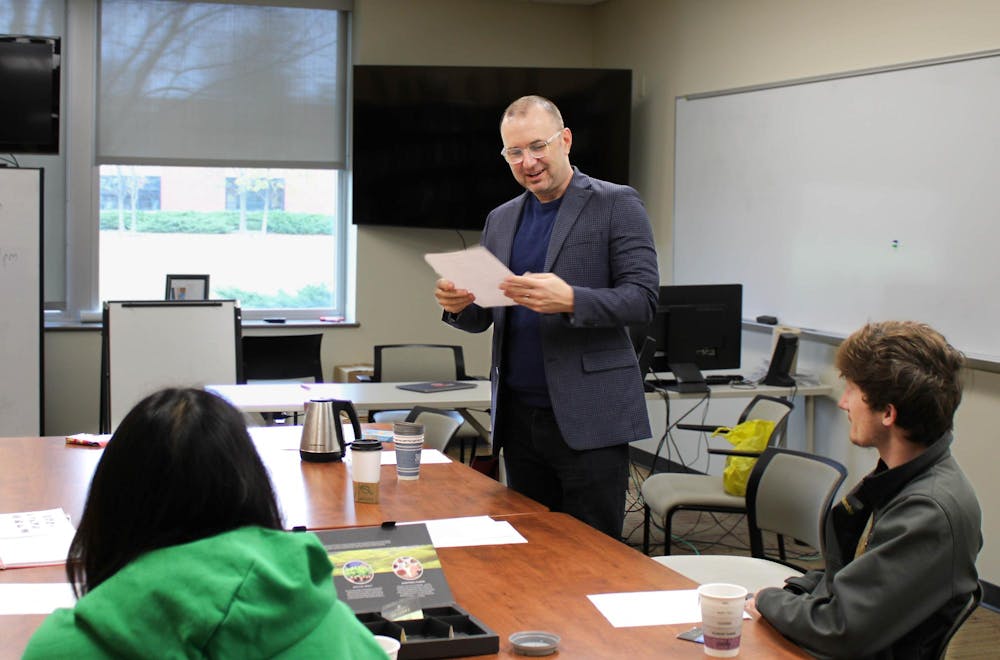The Global Studies Department is offering a new class Spring semester: Chinese Culture and Communication — Building Bridges, Strengthening Relationships.
Geoff Hoffman, assistant professor of Mandarin and ESL, will teach the three credit hour class. Class will be held from 2-3:15 p.m. and will fulfill a foundational cross-cultural course requirement.
The course description emphasizes how Taylor students can benefit from studying Chinese language and culture, citing the number of Chinese-speaking students at Taylor as well as the trading relationships between the U.S., Taiwan and China. Hence, the course description said, “…knowledge of how to interact and build relationships with Chinese speakers is very important for reasons of economy and security and most importantly for God’s kingdom purposes.”
While Hoffman has planned to introduce another course in the East Asian Studies concentration for some time, it has taken a while because of his limited availability.
Hoffman hopes to increase the standing of Taylor’s Chinese courses within the student body.
“We also offer Mandarin Chinese here as a language, and the enrollments have been pretty slow, pretty low for that class,” Hoffman said. “So I’m also trying to raise awareness of the Chinese language and build interest in that.”
The new course moves beyond language. While the course does teach some basic phrases, suited for daily life and sharing the Gospel, “the class will focus on how culture interrelates with and affects communication with speakers of Chinese,” Hoffman said. “You will also have the unique chance to reflect deeply on your own culture and compare it with the culture of Chinese speakers. So that’s the basic idea of the course. So it’s not just a language course.”
Hoffman intends the course to be rigorous. As a level 300 class, he warns students to expect a heavy load. Assignments will consist of weekly reading and related reflections, an interview assignment and a research paper at the end of the course.
The course also bolsters Taylor’s cultural capabilities, he said.
“While we have language courses that touch cultural forms of knowledge, I really think that we need that course dedicated to different cultures from an academic standpoint,” Nate Chu, director of the Office of Intercultural Programs (OIP), said. While Chu acknowledges the existence of co-curricular programs, such as the Sejong Korean Institute, he believes that this is the first cultural course specifically in an academic setting.
Additionally, Chu believes the course can help Asian Americans grapple with their own identities.
“While we have around 20 international students from China, we also have a group of Chinese American students that, for their own identity formation and understanding, (might) benefit from taking a class like this,” Chu said.
Chu said the Asian American identity is a complex one, affected by the “model minority myth” and the idea of being the perpetual foreigner. Many Asian Americans struggle with feeling disconnected from their parents and their culture, he said. That struggle intensifies as they graduate into college, and wrestle with their heritages, despite having grown up in America.
Yet for the purpose of gaining cultural competency, Chu acknowledged that one class can’t fully teach cultural understanding, stating one can never know enough about culture. Far more important to learning about culture is the recognition of nuance in and the humility to observe while seeking to understand.
The danger, Chu said, is that one can learn a lot, and yet still not know how to apply that knowledge in the context of the actual culture.
Yet the focus of the class is not on pure language acquisition or on learning to perfectly understand Chinese language and culture. Instead, Hoffman has his eyes fixed on things above.
“The most important thing is God’s kingdom,” he said.
The class, he said, offers students a chance to find new ways to share the Gospel with people who speak Chinese or are from a Chinese background.





